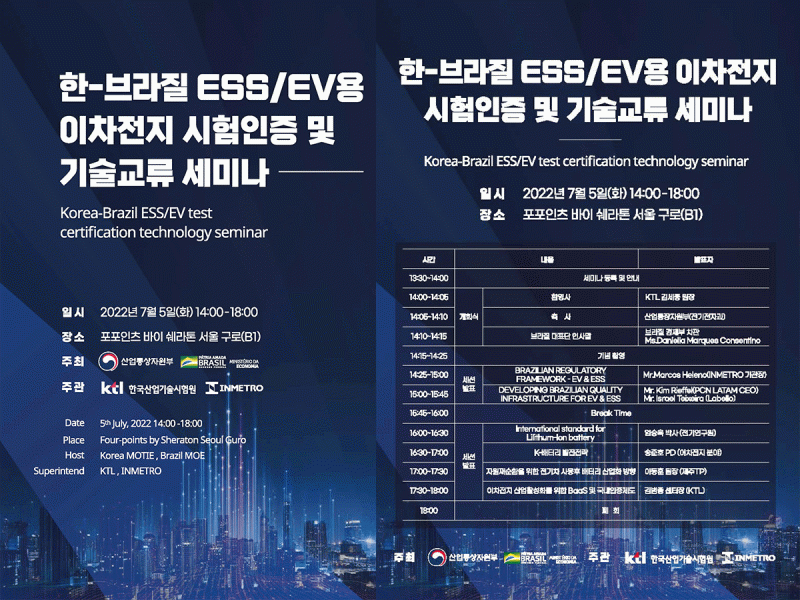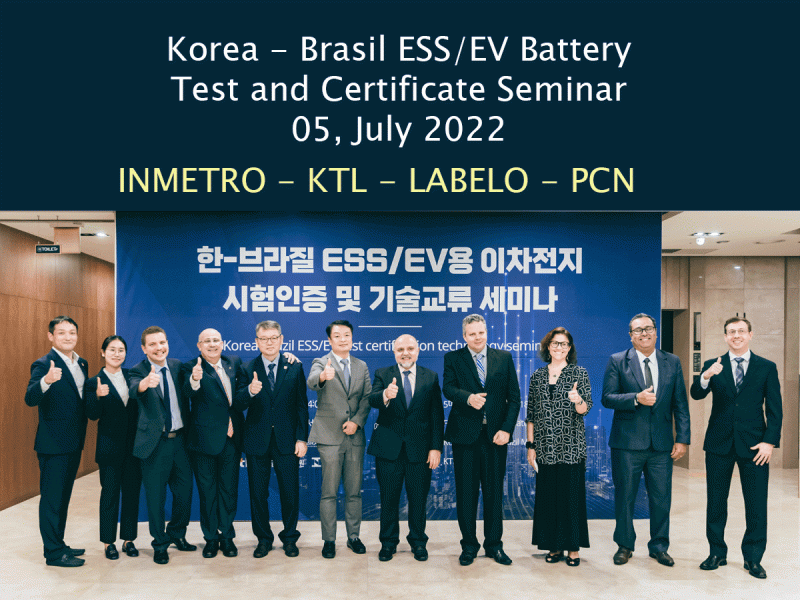KTL - INMETRO MOU

PCN led the signing of an MOU between INMETRO (National Institute of Metrology and Quality) and Korea Testing Laboratory (KTL) for cooperation in testing and certification in the fields of electricity, electronics, storage system and energy management in Brazil. National Institute of Metrology, Quality and Technology (INMETRO) is a government agency that manages and operates compulsory safety certification technical standards and systems for industrial products such as automobile parts, industrial parts, home appliances, and baby products in Brazil. Korean battery manufacturers have been facing difficulties in exporting to Central and South America due to high test cost, long time required, lack of information, etc.; through this MOU, Korean battery manufacturers will be able to easily and conveniently provide test and evaluation services through KTL when exporting to Central and South America such as Brazil. Further on, KTL and INMETRO made a promise to further establish a close collaboration system in area such as Electricity, electronics, storage system and energy management - Safety, energy efficiency and electromagnetic compatibility (EMC) testing and certification - New business development - Law and regulatory information exchange - Workshops and technical seminars.

In the afternoon, KTL and INMETRO co-hosted the “Korea-Brazil ESS/EV Battery Test and Certificate Seminar”. Around 70 rechargeable battery-related experts attended this seminar, and further shared international standards and technology trends related to secondary batteries and also provided a venue to understand the energy policies related to ESS and EV of the Korean and Brazilian governments. PCN LATAM's CEO, Kim Rieffel, was the first speaker of the seminar and presented an EV operation scenario in Brazil. He has emphasized the reason for the increasing number of EV’s issues is the EV charging infrastructures and E-mobility related technology evaluation tools. Stating that Brazil currently does not have well-established E-mobility-related technology evaluation tools, standards for certifying EV performance or testing and verification for export. Kim Rieffel said that making ESS and EV-related certifications and tests possible is not only beneficial for Brazilian companies but also for overseas companies that want to export to Brazil; He emphasized that we should achieve a win-win situation through the application of Korea's excellent technology to the large Brazilian market and further solving issues of EV realization and carbon neutrality. Various topics were presented, such as Specific international standards for lithium-ion batteries (presented by Eom Seung-wook, head of the Korea Electrotechnical Research Institute's next-generation battery research center), K-battery R&D strategy (presented by Song Joon-ho, Korea Evaluation Institute of Industrial Technology secondary battery PD), the direction of industrialization of batteries after using electric vehicles for resource recycling (presented by Lee Dong-hun, Jeju TP Energy Convergence Center Utilization Technology Development Team Leader), BaaS for revitalizing the rechargeable battery industry and domestic certification system (presented by Kim Beom-jong, Head of KTL New Power Industrial Technology Center). Reference: Today Energy (http://www.todayenergy.kr)

